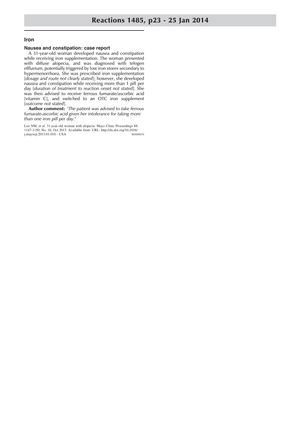TLDR A woman had nausea and constipation from iron pills taken for hair loss due to low iron.
A 31-year-old woman developed nausea and constipation as side effects from iron supplementation, which was prescribed to treat her diffuse alopecia caused by telogen effluvium, potentially due to low iron stores from hypermenorrhoea. The specific dosage and route of the iron supplementation were not clearly stated, and the duration of treatment before the onset of side effects was not mentioned. Upon experiencing intolerance to taking more than one iron pill per day, she was advised to switch to a combination of ferrous fumarate and ascorbic acid (vitamin C) and to use an over-the-counter (OTC) iron supplement, although the outcome of this change was not reported.
 1 citations
,
September 2013 in “Mayo Clinic Proceedings”
1 citations
,
September 2013 in “Mayo Clinic Proceedings” A woman's hair loss was treated successfully with iron supplements for her iron deficiency.
 1 citations
,
September 2013 in “Mayo Clinic Proceedings”
1 citations
,
September 2013 in “Mayo Clinic Proceedings” A woman's hair loss was treated successfully with iron supplements for her iron deficiency.
 14 citations
,
December 2010 in “Dermatologica Sinica”
14 citations
,
December 2010 in “Dermatologica Sinica” New treatments for hair loss show promise, but more development is needed, especially for tough cases.
 August 2023 in “Tzu Chi Medical Journal”
August 2023 in “Tzu Chi Medical Journal” Iron deficiency is the main cause of hair loss in women, and iron supplements started within 6 months can improve hair health.
 January 2019 in “Indian Dermatology Online Journal”
January 2019 in “Indian Dermatology Online Journal” Stress, hypothyroidism, drug intake, and anemia are important factors in women's diffuse hair loss.
 3 citations
,
January 2017 in “Journal of Pakistan Association of Dermatology”
3 citations
,
January 2017 in “Journal of Pakistan Association of Dermatology” Women with certain types of hair loss may have low iron levels, and iron supplements could help.





